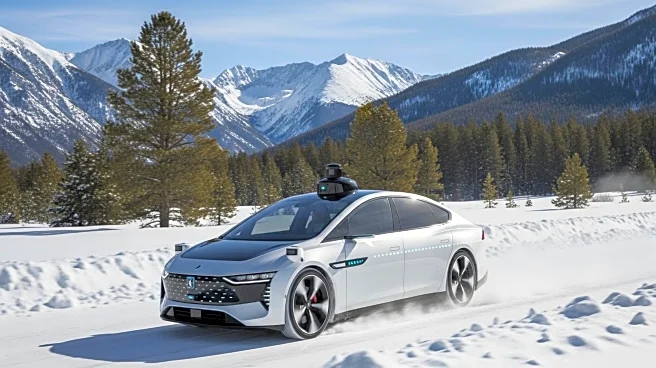What is the story about?
What's Happening?
Waymo has initiated testing of its autonomous vehicles in Denver, Colorado, as part of its plan to expand its robotaxi service in the region. The testing comes as the company faces challenges posed by winter storms and snowy conditions, which can interfere with the sensors that guide driverless cars. Waymo's vehicles utilize cameras, radar, and lidar to create 3D maps of their surroundings, but snow-covered lane markings and falling snow can create 'noise' that must be filtered out for accurate decision-making. Frankie Zhu, an assistant professor at the Colorado School of Mines, is working on algorithms to filter out this noise, ensuring the lidar units can accurately scan the environment despite disruptions caused by snowflakes.
Why It's Important?
The testing of Waymo's driverless taxis in Colorado is significant as it addresses the challenges of operating autonomous vehicles in harsh winter conditions. Successful adaptation to these conditions could pave the way for broader deployment of autonomous vehicles in regions with similar climates, potentially transforming transportation systems. This development could benefit industries reliant on logistics and transportation, while also impacting public policy regarding autonomous vehicle regulations. However, it also raises concerns about the reliability and safety of autonomous vehicles in extreme weather, which could affect public perception and acceptance.
What's Next?
Waymo's testing in Colorado is expected to continue, with the company likely to refine its algorithms and sensor technologies to better handle winter conditions. The results of these tests could influence future deployments in other snowy regions. Stakeholders, including local governments and transportation agencies, may need to consider regulatory adjustments to accommodate autonomous vehicles. Additionally, public feedback and acceptance will play a crucial role in determining the pace of expansion for Waymo's services.
Beyond the Headlines
The adaptation of autonomous vehicles to winter conditions could have broader implications for the development of smart transportation systems. It may lead to advancements in sensor technology and data processing algorithms, which could be applied to other industries, such as aerospace and robotics. Furthermore, the ethical considerations of deploying autonomous vehicles in challenging environments will need to be addressed, ensuring safety and reliability are prioritized.














